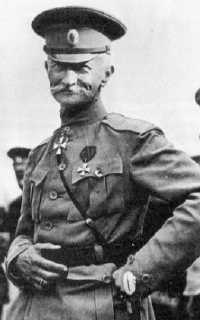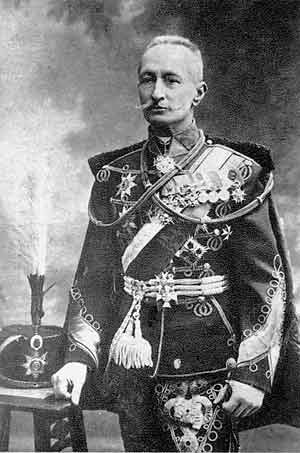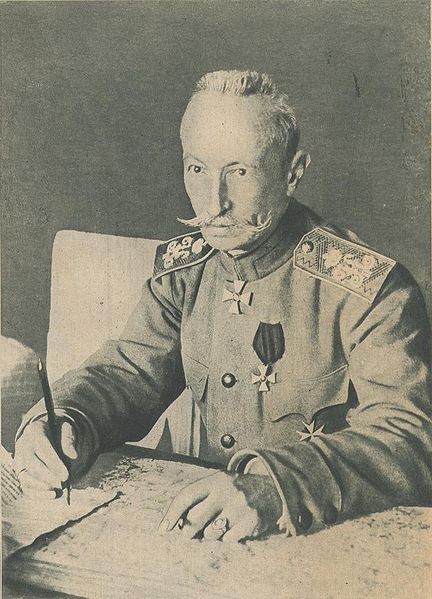<Back to Index>
- Economist and President of Warsaw Stefan Starzyński, 1893
- Writer Samuel Richardson, 1689
- General of the Imperial Russian Army Aleskei Alekseevich Brusilov, 1853
PAGE SPONSOR



Aleksei Alekseevich Brusilov (Russian: Алексе́й Алексе́евич Бруси́лов) (19 August [O.S. 31 August] 1853 – 17 March 1926) was a Russian general most noted for the development of new offensive tactics used in the 1916 offensive which would come to bear his name. The innovative and relatively successful tactics used were later copied by the Germans. His war memoirs were translated into English and published in 1930 as A Soldier's Notebook, 1914 – 1918.
Brusilov was born in Tiflis (now Tbilisi, Georgia). His father was Russian, his mother, Anna Luiza Niestojemska, was Polish. Three generations of Brusilov's had served as officers in the Tsar's army, his grandfather fighting in the defense against Napoleon's invasion of 1812. His father rose to the rank of Lieutenant General before dying of tuberculosis in 1856. Brusilov's mother died shortly afterwards, and the young orphan was raised by relatives in Kutaisi.
He was educated at home until at the age of 14, he joined the Imperial Corps of Pages in Saint Petersburg in 1867. At the end of his first year, a tutor remarked of Brusilov, "his nature is brisk and even playful, but he is good, straight - forward and clean - living. Of high ability, but inclined to be lazy." The description of the youth would still be true of the general, fifty years later (except, it would seem, on the issue of laziness).
In
1872, on completion of the Corps' program, he sought admission to the
advanced class for top ranking students, but was unsuccessful, and
instead was posted as an ensign to the 15th (Tver) Dragoon Regiment. Usually, graduates from the Corps of Pages sought admission to one of the Guards regiments,
but the Tver Dragoons were at that time stationed near Kutaisi, so the
posting suited Brusilov on the basis of being near his family and being
less financially draining than service in the Guards. Brusilov joined the Tver Dragoons in August, 1872, and was given command of a troop, but it was not long before his aptitude resulted in appointment as regimental adjutant. He was promoted to lieutenant in 1874. Brusilov served with distinction in the Russo – Turkish War, 1877 – 78, being mentioned in despatches on three occasions. His unit operated on the Southern Front in the Caucasus, and took part in the assault of the fortress of Ardagan (now Ardahan, Turkey), for which Brusilov was awarded the Order of Saint Stanislav, 3rd Class. Later in the war, he also received the Order of Saint Anne, 3rd Class, and was promoted to the rank of Stabskapitän. Towards the end of the war, he led successful attacks on Turkish positions around Kars, and his membership of the Order of Saint Stanislav was elevated to 2nd Class. In
1881, Brusilov became a student at the Cavalry Officer School in St
Petersburg and two years later was appointed as a riding instructor
there. He spent the next thirteen years in a succession of posts at the
school - Adjutant, Senior Teacher of Riding and Breaking Horses, Section
Commander, Troop Commander, Squadron Commander and Assistant Chief of
the School. On promotion to Major General in 1900, Brusilov was added to
the list of Household Troops (officers who might be retained on
official business by the Tsar). During this time, Brusilov married
(1884), and the union produced a son in 1887. In
1902, as a Lieutenant General, he took command of the school, and under
his leadership, the "Horse Academy" became an acknowledged centre of
excellence in preparing staff officers for the cavalry. Brusilov
published a number of papers on the use of cavalry, and visited France, Austria - Hungary and Germany to study riding tuition and stud management. Brusilov was appointed to command the 2nd Guards Cavalry Division in 1906, but this was not a happy posting for him. The Revolution of 1905 had left St Petersburg in turmoil, and after his wife's death, he sought a posting away from the Guards and the capital. In
1908, he was appointed to command the XIV Corps in the Warsaw Military
District, where his tenure was notable for the improvements in combat
training he implemented. He also remarried at this time, to Nadejda
("Hope") Jelihovski. Promoted to General of Cavalry in 1912, he became
Deputy Commander - in - Chief of forces in the Warsaw Military District. The
failures of the Russo - Japanese War had
led to allegations that Generals from immigrant families, who made a
significant fraction of the Russian Army's senior ranks, were less
patriotic than those who traced their origins to within Russias borders,
and Brusilov would come into conflict with the Governor - General in
Warsaw, Georgi Skalon, and other "Russian - German" generals in that District. Brusilov was soon seeking another post. In
1913, Brusilov was posted to command the XII Corps in the Kiev Military
District, remarking on his departure, "I do not doubt, that my
departure will produce a sensation in the troops of Warsaw region...
Well! What’s done is done, and I am glad, that I have escaped cesspool
of Skalon’s court atmosphere." In July 1914, with the Russian army expanding on mobilization, Brusilov was promoted to command 8th Army, part of South - west Front, operating in Galicia.
The 8th Army crushed the Austro - Hungarian forces before it, and rapidly
advanced nearly 150 kilometers (94 miles). Reverses elsewhere along the
Front, including the great defeat at Tannenberg, forced the 8th Army to retire in conformance with the general Russian withdrawal. For his victories, Brusilov was awarded the Order of Saint George 4th, and then 3rd Class. By a quirk of fate, several future White Army commanders held senior posts in 8th Army at this time — Brusilov's Quartermaster general was Anton Denikin, while Alexey Kaledin commanded the 12th Cavalry Division and Lavr Kornilov was in command of the 48th Infantry Division. In the early part of 1915, Brusilov again advanced, penetrating the Carpathian passes and entering the Hungarian plain. At this time, Nikolai II visited
the 8th Army and Brusilov was promoted to the rank of General - Adjutant (in
the Imperial Russian Army this was a "four - star" General rank). Once again, fortunes on other fronts would determine his actions and the Austrian - German breakthrough at Gorlice - Tarnów forced Brusilov to conform to the general retirement. By September, the 8th Army had withdrawn 180 kilometers (110 miles) to the Tarnopol region. On
29 March 1916, Brusilov was given command of Southwest Front, and
managed to secure a certain degree of freedom of action. Previous
Russian offensives demonstrated a tendency to assault smaller and
smaller sections of front with increasing density of artillery and
manpower to achieve a breakthrough. The narrow frontage of these attacks
made counterattacks straightforward for German forces, and this
approach met with repeated failure for the Russians. Brusilov
decided to distribute his attack over the entirety of the Southwest
Front. He hoped to disorganize the enemy over such a large area that
some point would fatally give way. He decided not to waste resources by
saturation bombardment of worthless areas, but to use interdiction fire
against command posts, road networks, and other vital targets to
degrade German command and control over the whole front. The noted
German artillery commander, Georg Bruchmüller,
having served opposite Brusilov's Front at this time, would learn from
and adapt these tactics when planning the preparatory bombardment for Operation Michael on the Western Front in
1918. Brusilov was not even concerned with securing a great local
advantage in manpower, permitting Divisions under his command to be
transferred to other Fronts (so long as they attacked in support of his
offensive). Brusilov's
new techniques were, by First World War standards, highly successful
and over the next three months, the Southwest Front advanced an average of
more than 30 kilometers along a front of more than 400 kilometres (250
miles), taking 400,000 Austro - Hungarian prisoners in the process.
However, the planned supporting attack from the West Front (the Army group to
Brusilov's north) was not delivered, and Germany was able to transfer
17 Divisions from France and Belgium to halt the Russian advance. Brusilov
would be awarded the Sword of Saint George with Diamonds for his
greatest victory, one of only eight Russian commanders to receive this
rare award during the First World War. On 18 June 1916, an article "Hero of the Hour in Russia, Described Intimately by One Who Knows Him Well" by Brusilov's brother - in - law, Charles Johnson, appeareared in the New York Times. With the onset of revolution in Russia, Brusilov argued for the Tsar's abdication. When approached by Stavka for
his opinion on the need for the abdication he replied, "... For the
moment the only thing that matters is to stabilise our position to allow
the continuation of the war with the external enemy... to abdicate in
favour of Tsarevich Mikhail Alexandrovich and
a council of regents... It is necessary to hurry, the faster to
extinguish the flames [of revolution], otherwise we face innumerable
catastrophic consequences." In May 1917, Brusilov was appointed Commander in Chief of the Russian Army. Throughout
this period, Brusilov proved sympathetic to revolutionary aspirations,
but his primary concern was that the war first needed to be won. In
particular he asserted that until peace was achieved, the full authority
of the central government must be respected, and that the army should
maintain the full rigour of its disciplinary code. In a telegram to the
Minister of War, Alexander Kerensky,
he wrote, "... only the application of capital punishment will stop the
decomposition of the army and will save freedom and our homeland". This politically unpopular stand, together with the failure of the Kerensky Offensive in July 1917, led to Brusilov's replacement as Commander in Chief by his former deputy, Lavr Kornilov. Brusilov moved to Moscow and remained there at the disposal of the Provisional Government. When fighting broke out in Moscow following the October Revolution, Brusilov was severely wounded in the foot by a splinter of a shell that hit his bathroom. Brusilov
was torn by conflicting loyalties in the Revolution, and the Civil War
that followed. His former soldiers were largely serving in the newly
formed Red Army,
and he concurred with the need for radical change, but as a
conservative, patriot and monarchist his personal values were more in
tune with those of the White faction. Initially,
Brusilov served on a special commission to determine the size and
structure of the Red Army. Later, he led cavalry recruit training and
became Inspector of Cavalry. He retired in 1924, but continued to carry
out commissions for the Revolutionary Military Council. Seventy
when retired in 1924, he lived in his shared apartment with his sickly
wife and another couple. He died in Moscow from congestive heart
failure, and was given an honorable state funeral, buried at the Novodevichy Cemetery, by representatives from the 'new Russia' (the bolsheviks), and the 'old Russia' (the clergy, the middle and upper class).
According to the assessment of British Field Marshal Bernard Law Montgomery, Brusilov was one of the seven outstanding fighting commanders of World War I (the others being Falkenhayn, Ludendorff, Mustapha Kemal, Plumer, Monash and Allenby).